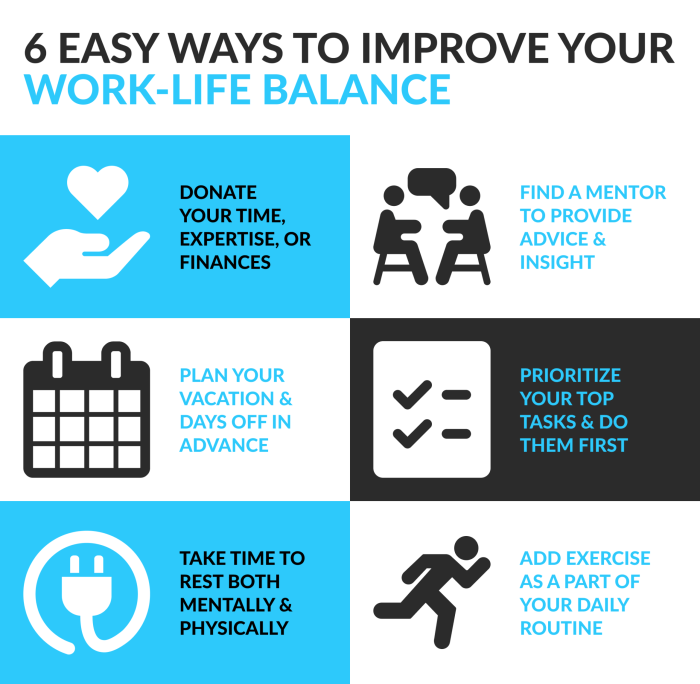Kicking off with Work-Life Balance Tips, this opening paragraph is designed to captivate and engage the readers, setting the tone american high school hip style that unfolds with each word.
In today’s fast-paced world, juggling work responsibilities and personal life can be challenging. Finding the right balance is key to leading a fulfilling and productive life. Let’s dive into some essential tips for achieving that perfect equilibrium.
Importance of Work-Life Balance

Achieving a work-life balance is crucial for overall well-being. It allows individuals to maintain a sense of harmony between their professional responsibilities and personal life, leading to reduced stress and improved mental health.
Impact of a Lack of Work-Life Balance
A lack of work-life balance can have detrimental effects on mental and physical health. It can lead to increased stress, anxiety, and burnout, ultimately impacting one’s overall quality of life. Additionally, neglecting personal time can result in strained relationships with family and friends, further exacerbating feelings of isolation and dissatisfaction.
How Work-Life Balance Can Improve Productivity and Job Satisfaction, Work-Life Balance Tips
When individuals prioritize work-life balance, they are more likely to feel energized, focused, and motivated in their professional roles. By taking time for self-care and relaxation, employees can recharge and approach their work with a fresh perspective, leading to increased productivity and job satisfaction. Additionally, a healthy work-life balance can foster a positive work environment, boosting morale and reducing turnover rates within organizations.
Strategies for Achieving Work-Life Balance
Finding a balance between your work life and personal life is crucial for overall well-being and happiness. Here are some strategies to help you achieve that balance:
Setting Boundaries Between Work and Personal Life
It’s important to set clear boundaries between your work and personal life to avoid burnout and maintain a healthy balance. Here are some tips:
- Avoid checking work emails or taking work calls outside of work hours.
- Create a designated workspace at home to separate work and personal activities.
- Communicate your boundaries with your colleagues and managers so they understand your availability.
Techniques for Time Management
Effective time management is key to balancing your work and personal life. Here are some techniques to help you manage your time efficiently:
- Create a daily schedule or to-do list to prioritize tasks and maximize productivity.
- Use time-blocking to allocate specific time slots for work, personal activities, and self-care.
- Delegate tasks when possible to avoid feeling overwhelmed and free up time for other activities.
Importance of Self-Care Practices
Self-care is essential for maintaining work-life balance and overall well-being. Here are some self-care practices you can incorporate into your routine:
- Make time for activities that bring you joy and relaxation, such as exercise, meditation, or hobbies.
- Prioritize sleep and ensure you are getting enough rest to recharge and stay focused.
- Practice mindfulness and be present in the moment to reduce stress and improve mental clarity.
Remote Work and Work-Life Balance
Working remotely has become increasingly popular, blurring the lines between work and personal life for many individuals. This shift in work dynamics has both challenges and benefits when it comes to maintaining a healthy work-life balance.
Creating a Designated Workspace
When working remotely, it is essential to create a designated workspace at home to separate work from leisure. This can help establish boundaries and signal to your brain that it is time to focus on work. Here are some tips for creating an effective workspace:
- Choose a quiet area in your home where you can work without distractions.
- Invest in a comfortable chair and desk to support good posture and reduce physical strain.
- Organize your workspace with necessary supplies and tools to enhance productivity.
- Add personal touches like plants or artwork to make the space inviting and inspiring.
Challenges and Benefits of Remote Work
Remote work presents unique challenges and benefits in relation to work-life balance. Understanding these factors can help individuals navigate the remote work environment more effectively. Here are some key points to consider:
- Challenges:
- Difficulty in setting boundaries between work and personal life.
- Feelings of isolation and lack of social interaction.
- Potential for longer work hours due to the convenience of working from home.
- Benefits:
- Flexibility to create a customized work schedule.
- Elimination of commute time, reducing stress and increasing productivity.
- Opportunity to work from anywhere, providing a better work-life balance for some individuals.
Healthy Habits for Improved Work-Life Balance

In order to achieve a better work-life balance, it is essential to incorporate healthy habits into your daily routine. These habits can help you manage stress, stay physically fit, and maintain overall well-being.
Incorporating Exercise and Physical Activity
Regular exercise is crucial for both physical and mental health. Here are some tips to help you incorporate exercise into your busy schedule:
- Start your day with a quick workout routine, such as a 20-minute yoga session or a brisk walk.
- Take short breaks throughout the day to stretch and move around, especially if you have a desk job.
- Find an exercise buddy to keep you motivated and accountable.
- Choose activities that you enjoy, whether it’s dancing, hiking, or playing a sport.
Maintaining a Healthy Diet
Eating nutritious foods is essential for maintaining energy levels and overall well-being. Here are some tips to help you maintain a healthy diet:
- Plan and prepare your meals in advance to avoid relying on fast food or unhealthy snacks.
- Include a variety of fruits, vegetables, whole grains, and lean proteins in your diet.
- Stay hydrated by drinking plenty of water throughout the day.
- Avoid excessive consumption of caffeine, sugar, and processed foods.
Importance of Getting Adequate Sleep
Getting enough sleep is crucial for productivity, mood regulation, and overall health. Here are some tips to help you prioritize sleep and improve your work-life balance:
- Establish a bedtime routine to signal your body that it’s time to wind down and relax.
- Aim for 7-9 hours of sleep per night to ensure that you are well-rested and rejuvenated.
- Avoid screens (phones, computers, TVs) at least an hour before bedtime to promote better sleep quality.
- Create a comfortable sleep environment by keeping your bedroom dark, quiet, and at a cool temperature.
Financial Well-being and Work-Life Balance: Work-Life Balance Tips
Financial stability plays a crucial role in an individual’s work-life balance. When faced with financial stress, it can be challenging to focus on work or enjoy personal life, leading to increased anxiety and decreased productivity.
Tips for Budgeting and Financial Planning
- Create a monthly budget outlining your income and expenses to track where your money is going.
- Set financial goals to work towards, whether it’s paying off debt, saving for a big purchase, or building an emergency fund.
- Avoid unnecessary expenses and prioritize needs over wants to ensure financial stability.
- Consider consulting with a financial advisor to help you create a solid financial plan tailored to your goals and circumstances.
Relationship between Financial Well-being and Quality of Life
Financial well-being directly impacts an individual’s overall quality of life. When financial stress is minimized, individuals can focus on their work, relationships, and personal well-being. Financial stability provides a sense of security and freedom, allowing individuals to pursue their passions and enjoy a balanced lifestyle without constant worry about money matters.
